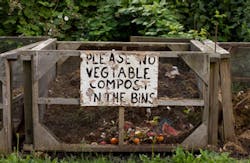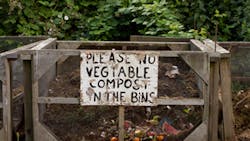Food businesses such as restaurants and grocery stores in Austin, Texas, will have to start composting their food waste by 2017 at the latest, under new rules developed by city lawmakers, Waste Recycling News website has reported.
Firms that will be affected by the law were involved in devising the legislation. Aiden Cohen, environmental conservation program manager for Austin Resource Recovery, explained that the local Restaurant Association actively participated in all the stakeholder meetings regarding the reforms. In fact, their input and concerns played a crucial role in developing a plan that was reasonable for the industry but still effective for pursuing the city's zero waste goal, he added.
The new legislation will not only change rules for composting and recycling by adding new requirements for businesses but will also bring Austin significantly closer to its goal for a 90-percent landfill diversion rate by 2040. Cohen stated that the law consists of two parts and one of them is to help the community set up working recycling programs. It has been estimated that a diversion rate of nearly 75 percent could be achieved just by recycling paper, plastics, glass and metal, Cohen added.
The updated rules were based on previous legislation that required all multi-family properties or apartment buildings with more than 75 units, as well as business properties over 100,000 square feet, to provide the necessary conditions for recycling to tenants. The second part of the legislation relates to businesses of all sizes and would see them implementing recycling strategies by October 1, 2016, Waste Recycling News said.
The Universal Recycling Ordinance came into effect on October 1, 2012, and the threshold of the size of properties will be lowered annually, so that eventually all homes are included. As of October 1, 2013, the legislation will cover apartment buildings of 50 units and more and office buildings of 75,000 square feet and above. Twelve months later the threshold will change again, this time to include 50,000-square-foot commercial properties of any type, Cohen explained.
Similarly, food businesses will also be included in the food composting scheme in several stages. The scheme will start in October 2016, when establishments bigger than 5,000 square feet will have to begin composting food waste, while a year later the rule will include restaurants and other food establishments of all sizes.
Not everyone will wait, though. There are businesses in Austin that have been doing this for years. Andrew Curren, part-owner and executive chef of 24 Diner, said that the restaurant had been composting its food waste for three years now. He noted that the trend was more common among more successful and financially stable establishments, which can afford the expenses related to the process. While the financial side of things is likely to be a major concern for a number of food businesses, Curren pointed out that lack of space would also be a problem, especially for businesses located downtown.

